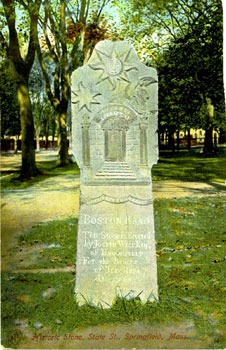Essay
Everyday Life - A Bloody Encounter
Militia Men and Regulators: Who was at the Arsenal?

Craters formed from the impact of grapeshot fired by the government militia at the approaching Regulators pitted a marker erected by Joseph Wait, marring its Masonic symbols of fraternity and benevolence.
More info
Courtesy Springfield Armory National Historic Park, Springfield, MA
In the winter of 1787, men from towns throughout Massachusetts heeded the call of the Massachusetts government for militia volunteers. In mid-January, sleigh loads of provisions and men from towns throughout Hampshire County began arriving at Springfield. By January 24th, Shepard had about 1,200 men under his command and was prepared to defend the Arsenal "at all hazards." Meanwhile, men from these same towns prepared to seize the Arsenal stores and take shelter in its barracks from the winter cold. Hundreds of men from the town of Colrain and Greenfield marched with the Regulators, while neighbors and acquaintances readied the Arsenal artillery that would fire upon them. Elizabeth Porter Phelps of Hadley wrote fearfully that it seemed as though nothing "but the immediate interposition of providence could prevent Blood."(1) Her premonition proved correct; Park Holland of Petersham recalled the shock he and others experienced upon hearing of the bloody encounter that killed five and wounded dozens more:
the Horror that I felt can't describe when I heard that blood was shed although I had lived through the other war yet to think that my oldest Brother was gone out on the side of Government and his youthful playmates on the other side was shocking beyond description…
It was verry unpleasant to me to find that one of the Dead Men that was brot of from the Field of Battle (if so it may be called) whose Name was Spicer had served Three years in the same Regiment with me in the late Revolutionary War and was a Towns man of mine. (2)
Revulsion and alarm increased as news of the deaths at the Arsenal spread. The people of Grafton felt "heartily affected to behold the Horrors of a Scivil War." The town of Hopkinton agreed, declaring that "altho' we may be constrain'd from a Love of our Country & its Laws, to join with the Law in pronouncing the Sentence of Death on our Brethren who have arisen in arms against Government; yet nature recoils at the thought of being Personally the Executioners of that Sentence."(3)
| Print | Top of Page